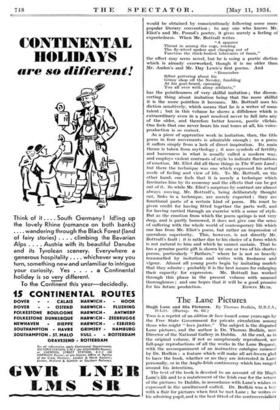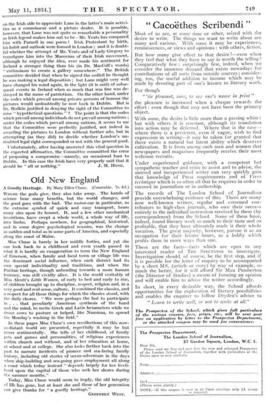The Lane Pictures Hugh Lane and His Pictures. By Thomas
Bodkin,
D.Litt. (Harrap. 8s. 6d.)
Tnis is a reprint of an edition de luxe issued some years ago by the Free State Government for private circulation among those who might " love justice." The subject is the disputed Lane pictures, and the author is Dr. Thomas Bodkin, now Director of the Xational Gallery in Dublin. At the end, as in the original volume, if not so sumptuously reprodUced, are full-page reproductions of all the works in the Lane Bequest, with the accompaniment of an instructive catalogue raisonne by Dr. Bodkin : a feature which will make all art-lovers glad to have the book, whether or no they are interested in Lane personally, or in the Anglo-Irish controversy which has ranged around his intentions.
The text of the book is devoted to an account of Sir Hugh Lane's life and to a restatement of the Irish'ease for the return of the pictures to Dublin, in accordance with Lane's wishes as expressed in the unwitnessed codicil. Dr. Bodkin was a boy with a flair for pictures when first he met Lane ; he writes as his admiring pupil, and is the best fitted of the controversialists on the Irish side to appreciate Lane in the latter's main activi- ties as a connoisseur and a picture dealer. It is possible, however, that Lane was not quite so remarkable a personality as Irish legend makes him out to be—Mr. Yeats has compared him with Parnell in one poem I Irish Protestant by birth, his habit and outlook were formed in London ; and it is doubt- ful whether the attempt of Mr. Yeats and of Lady Gregory to transfigure him into the Maecenas of their Irish movement, although he enjoyed the idea, ever made his sentiment for Ireland a stronger thing than his (in Dr. MacColl's words) " enthusiasm to create a gallery somewhere." The British committee decided that when he signed the codicil he thought he was making a legal disposition ; but Lane might very well have changed his mind again, in the light (it is said) of subse- quent events in Ireland when so much that was fine was de- stroyed in the name of patriotism. On the other hand, under the codes which prevail among private persons of honour the pictures would undoubtedly be now back in Dublin. But is Dr. Bodkin justified in denying the right of the Committee to raise hypothetical questions " ? The point is that the codes which prevail among individuals do not prevail among nations ; under the codes which prevail among nations, it seems to me that the Committee were perfectly justified, not indeed in awarding the pictures to London without further ado, but in attempting (as they did) to decide whether London's un- doubted legal right corresponded or not with the general good.
Unfortunately, after having answered this vital question in the expected affirmative, the Committee committed the error of proposing a compromise—namely, an occasional loan to Dublin. In this case the Irish have very properly said that it









































 Previous page
Previous page